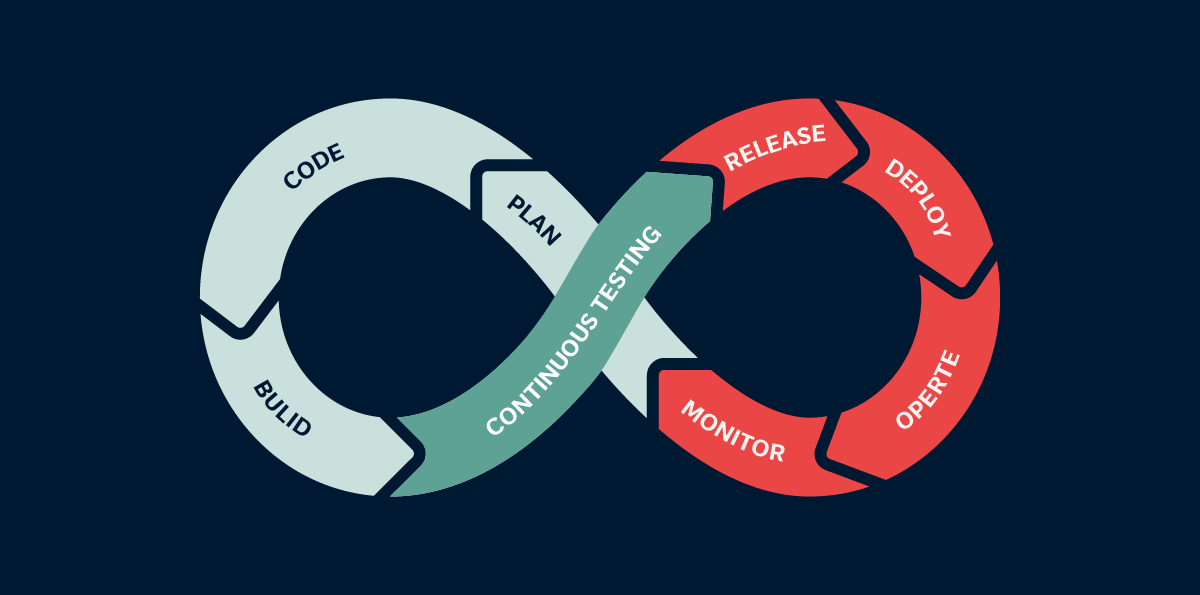Why DevOps Should Be Your Next Partner’s Core Philosophy
August 23, 2022 / 5 min read

Photo by Deva Darshan on Unsplash
The IT industry is always in a state of flux, with innovative ideas almost becoming the 'industry norm' overnight. Few of those ideas become a genuine part of the industry, but some do.
DevOps is one of them.
What is DevOps?
The DevOps name is a contraction of the terms 'development' and 'operations', indicating the merging of those roles for a collaborative or shared approach to the tasks performed by a company's application development and IT operations teams.
The DevOps meaning is a set of practices, processes, and principles of a particular business, department, or project to create a more reliable digital product in a shorter time.
The definition of DevOps sees departments that are usually siloed, like security, QA, and IT, coming together to streamline and speed up development cycles. DevOps complements the Agile working model, helping teams adapt to a client or market's demands as the product is being developed.
With all that said, there is no one clear definition of what DevOps is. However, it's widely agreed that the goal of DevOps is to make development and deployment as smooth as possible while meeting the key objectives or goals of the client or the project.
The Business Benefits of DevOps
Innovation and technology are always on the move, growing in ways that are hard to keep track of. The benefits of the DevOps philosophy are suited for such an environment.
To work in a 'traditional' siloed environment and not adhering to the DevOps philosophy is a surefire way to create problematic products that don't meet core needs.
Operating Without DevOps
Quality control and accountability are paramount to creating digital products that are scalable and robust. Expect product quality and accountability of teams and individuals to be less of a priority without the DevOps model. Manual processes tend to be slower, more cumbersome and error prone. It requires thinking and analysing, but at times it also involves the opposite – not thinking and acting quickly, thus creating more issues. Those issues need to be fixed as soon as possible, creating an environment of added stress and pressure.
Users tell you what they need and, therefore, what your product needs. But the lack of a DevOps framework means that features demanded by your users are usually slow to roll out, and deployments are irregular. A slow rollout of such features means that users may have found a workaround in that time or have stopped using the product altogether.
Another telltale sign of a process that lacks the DevOps framework is the frequency and severity of bugs. Fixing bugs in a DevOps-free environment takes longer, owing to the aforementioned lack of documentation and lack of accountability.
Operating With DevOps
The dynamic environment of the software industry helps DevOps principles flourish.
One of these benefits comes from CI or Continuous Integration. CI is the process of changes, features, and bug fixes being written into the production codebase constantly, rather than on an as-needed basis. CD or Continuous Deployment publishes the changes mentioned above to the production environment, which is seen immediately by the client and end users.
The DevOps framework makes it easier and much more transparent to roll back to a functioning release in the event that something does go wrong.
Other benefits of the DevOps philosophy make it easy to see why it's the standard way of operating in the industry. It shortens the time to market while removing roadblocks, thanks to its transparency and demand for accountability. Responsibility for the software is also shared between the client and developer, meaning both parties play an active, hands-on role in the creation and deployment of a digital product.
How has DevOps become more available to everyone?
As you just read, responsibility is shared between the developers and the end client. But if that end client isn't experienced or familiar with the DevOps philosophy, what are they to do? How are they to take advantage of this shared responsibility?
It's important to note that from the client's perspective, this responsibility may be simply overseeing what the developer or software houses are doing. Generally, this happens thanks to all parties having access to CI/CD workflows and the code repository in GitHub and, therefore, a thorough overview of workflow pipelines. This transparency brings peace of mind to all parties, even though the client only really takes an active interest in the differences between versions and what has changed from one release to another.
DevOps also sees developers working with code versioning. This means that should a buggy or imperfect iteration be pushed to the production arena, a backup of the last stable version and quickly take its place.
The final argument for the DevOps philosophy is arguably the best. Amazon AWS, Microsoft Azure, and Google Cloud Platform all adopted DevOps in their products. Microsoft Azure's DevOps suite goes above and beyond in the services it offers to complement existing workflows. Boards, repos, and test plans are just a few of the assets that Azure offers to developers.
Many SPAs (Single Page Applications) can be based and operate on platforms like Vercel and Netlify. Most of these platforms have built-in DevOps processes to help with development, which means that even the most basic single-page web application can reap the benefits of the DevOps framework.
The Benefits of Cooperating With a Company Built Around DevOps
As a business that's looking for more digital adoption, the features of DevOps are great to know, but the true value of DevOps lies in the overall benefits for your business.
More productive and engaged team
Teams on both ends of the creation process are more productive and engaged with the end product, as they've worked together toward a common goal from the very onset of the project. This is also exacerbated by the fact that DevOps automates repetitive, mundane tasks, regardless of their complexities. This frees up all team members to focus on other parts of the project or business and empowers them to innovate.
Early defect detection
Finding issues as early as possible is part of any good DevOps process, as it helps quickly remove any issues that customers may face. This is just one aspect of continuous feedback from the very beginning of the project, meaning if something is to fail, it will do so faster.
More time for innovations
More time can be spent on genuine innovation, your product's marketing, and making your business more valuable. Simply put, there's less downtime as the product is more stable thanks to continuous testing of the codebase, so you're spending less time maintaining and updating a product. Your time can be spent on other essential elements of your business rather than ensuring the product has been made to your standards.
The benefits of simplicity
Lastly, setting up DevOps has become significantly easier for every developer - even those that aren't working directly on production code, like frontend or backend developers. This means that small or medium projects don't have to hire a dedicated DevOps engineer, as DevOps processes and procedures are becoming 'normal' for all developers.
Conclusion
Strong returns and a clear pathway for innovation requires proactive and agile processes from developers - both individuals and teams.
A company with a DevOps culture provides precisely that.
One could argue that the ongoing digitization of our lives means that the future of all (or at the very least, most) businesses and industries relies on DevOps.
Teams collaborate, share their strengths, and come together to cancel out any weaknesses throughout the development lifecycle.
If you're looking for a partner to help you implement a tech stack built on the DevOps principles mentioned above, reach out to us.
Author

Andrzej Bogdoł
Frontend Developer
Andrzej is a web developer with over 6 years of professional experience. What makes him stand out from the crowd is his focus on business-related issues, his ability to see the bigger picture when assessing client needs and his active involvement in product development.
Related articles
![A well-crafted prompt doesn’t just work once. It works across teams, channels, and campaigns. It can be tweaked for new use cases and refined based on what performs best.]()
June 27, 2025 / 4 min read
Prompts are marketing assets: how to reuse, and scale them
Prompts aren’t throwaway lines. They’re repeatable, scalable assets that can streamline your marketing your team’s output. Learn how to build a prompt library that delivers.
![Woman using a wheelchair in the office settings]()
June 17, 2025 / 5 min read
What is accessibility and why it matters?
Accessibility ensures everyone — including those with disabilities or limitations — can read, navigate, and engage with your content equally.



